By Dr. Qemal Lame
The third part
Memorie.al/The state of the dictatorship of the proletariat in the political system of the period of dictatorial socialism staged and propagated that it had “discovered” enemies, traitors, saboteurs, conspirators and coup plotters to strike and eliminate political opponents, as well as to artificially create situations that hid with the platform of class struggle to escalate state violence and divert attention from the serious problems of the political, economic and social crisis. In the “Synoptic Table”, where the plenum of the Central Committee of the ALP is documented, which condemned the “plot of the polyagent Mehmet Shehu” with main collaborators Kadri Hazbiu, Feçor Shehu, etc., Enver Hoxha himself said that: he has all the plots Revealed Party and None of the State Security!
This statement is clearly understood by all that he was the person who had discovered and condemned the enemies of the people and the Party. His potential opponents who endangered absolute power were eliminated and punished. Those whom he considered the most trusted who had been entrusted with the implementation of the orders for the elimination and disappearance of persons declared enemies were also eliminated. This method also hid the evidence, the main witnesses who could become dangerous to his idealized figure even after his death, and any case of investigations with the change of the political system, although it was thought to be eternal.
The tragedy of the violence of the dictatorial state is clearly documented in the secret agency activity of the State Security, the investigation, the prosecution and the court, which is clearly convincing in the forged case of the group that was accused and convicted of diversion and sabotage in the Textile Factory. in Berat. In this issue, we learn the serious consequences of the dictatorship for the punishment of innocent people through the criminal legends of the State Security, approved by the leadership of the ALP and imposed to be legislated by the investigation, the prosecution and the court.
– The trial of the group accused of “diversion, sabotage, agitation and propaganda, theft, illegal possession of weapons, etc.” at the Textile Factory in Berat.
Continued from the previous issue
The prosecutor and the presiding judge, Aliu and I, explained that: “The procedures provided in the Code of Criminal Procedure are being implemented. The trial has just begun. It is not appropriate to raise concerns at this stage of the trial … ”
Emphasized the opinion that the leadership was unprofessionally informed:
-Judgment before the people, it is necessary to prove the correctness in the implementation of the trial procedure. The trial cannot begin with the unmasking of the defendants and their intentions. Once the defendants are heard, they will move on to the stage of deepening the trial, unmasking the criminal offenses and their perpetrators. At this stage of the trial, interventions are made to concretely identify the social danger of criminal offenses and defendants. We are strictly following the procedural rules. This will convince the people who are in the courtroom and the large crowd that has filled the square in front of the Palace, who are listening directly to the trial through loudspeakers.
Our explanations were legal and convincing.
Mine Guri, took directly the secretary of the Central Committee, Hysni Kapo and then Ramiz Alia, and informed him of the explanations given by the prosecutor and the judge, specifically mentioning our names and opinions.
-Shoku Hysni. According to your order, I called the prosecutor and the judge, I have here, comrades Qemal Lame and Ali Zanko. Both tell me that once the trial has started, the procedure is being followed meticulously. Once the statements of the defendants on the charges are heard and taken, the phase of unmasking the acts and the culprits will be passed. We are confident that the trial will achieve its goal …
The arguments given by us and broadcast live by Mine Guri, had an effect.
We heard Hysni say:
-Good! So, we agree. However, urge the prosecutor and the judge to act firmly. Judgment has political significance. Legal proceedings serve the interests of the Party. That is why we have entrusted them with that process. Unmask the defendants. To acquaint the people more concretely with the pronounced social danger of diversion, sabotage, theft, use of explosives, etc. To understand well by the people the responsibility of the defendants for the acts committed by them and the consequences that would come if they were not arrested in time. Public opinion and those present in the hall are required to recognize and condemn this diversionary and sabotaging activity. From all, to know the danger and the serious consequences of income and what could have happened, if the timely detection of this hostile group had not been done. The people, the military and everyone, are required to see how the rule of law is enforced by the court and the prosecution. The party has no mercy for enemies, traitors, saboteurs, diversions, etc., etc.
We returned by car.
Before entering the hall, we talked together with Ali. It was necessary to act to react to the criticism made, but also to be as objective as possible in the trial.
We were both clear that:
-The Chairman of the Branch of Internal Affairs, Pëllumb Kapo, had made our stay in the Ministry of Internal Affairs and directly in the Central Committee a problem. We must react, but always according to the law. To the extent necessary to make known the dangerousness of the acts committed and the perpetrators. But, this is considered insufficient. The Branch President has complained. He seems to be unhappy with our attitude. He has unjustly accused us in the leadership of the stance taken, leaving the defendants free to give explanations. We are required to be more active in judgment. Our work as a prosecutor and a judge has focused on the educational and preventive role of the court, based on procedural rules. We have requested the application of procedural rules in the investigation, but this has raised concerns. From the highest bodies of the Party, we are not required to show how we apply the procedure and rules for the legality of trial and punishment. It is strongly required to influence people concretely, to focus the attention of social opinion on the social danger of diversion, sabotage, agitation, etc., and the responsibility of the defendants. We will do this based on the legal criteria for the charges against the defendants and the procedural norms of the trial.
We reflected on the orders given, adhering to the legal procedural criteria. The hostile activity and the accusations against the defendants were unmasked, based on the guilt admitted by them. Within the possibilities we had, care was taken in the ethics of the trial to respect the procedural criteria of the rights and dignity of the defendants.
No suspicions or objections to the charges were made known during the trial
Defendants, witnesses or persons who discussed did not express any views on violence, forgery or ideas that could shed light on inaccuracies or intentional actions to impose the agency, investigative and judicial process.
In the show “Memorie”, of Tv Scan, on May 29, it became known for a statement of a former officer of Xhenjo who claims that during the trial he said that with the amount of explosive that the defendants are accused of, he could not throw in the wind of the combine …!
These sayings have become popular after 43 years. The motives of this attitude are not known. In order to clarify these statements, it is appropriate that they be verified with the documents of the investigative and judicial file.
To my knowledge, as I reasoned on the show, I note that in the trial of the case there was no allegation by any person including this former witness, former genius officer.
It is fair and acceptable to say that with the number of explosives mentioned in the indictment, reviewed and analyzed in the court session and fixed in the court decision, the combine could not be blown up. It was not about blowing up the whole plant in its entirety, but only about the act of diversion and sabotage.
There are no allegations of this nature reflected in any procedural documents of the investigation and the court. The minutes of the court session were written correctly and responsibly by the secretary, who was the chief secretary of the Berat District Court.
The falsified investigation process and the physical and psychological violence against the defendants and witnesses who carried out the sabotage diversion scenario, have influenced the documents to be drafted and justified according to the goals envisaged and pursued militarily by the persons who followed the case by the Security and investigators. were of the same status as State Security officers. There has been no word to enable allegations of violence or falsification of data administered as evidence in support of the allegations.
I responsibly emphasize that if any claim of any person had been made it would have been immediately discussed and analyzed directly by me as a prosecutor. It would be an opportunity to react with the opportunities I had to deepen the investigation and seek to return the matter to the investigator to complete the investigation.
Professional and moral ethics
Professional ethics and correct communication were respected in the trial. There are no offensive words. The dignity and personality according to the norms of civic morality have been respected. In the public opinion and relations with colleagues, the correctness and ethics of communication and civic education has been and remains known by the prosecutor and the judge of this case.
Reasoning of the court decision
At the end of the trial, the last word of the defendants is heard. Even at this critical stage the defendants accepted the charges without any objection and asked for mercy for the sentence. They talked and looked at the branch president, the Chief Investigator and the investigator.
The trial ended after 18:00.
The night remained to argue the court decision.
The judge, presiding over the hearing, Aliu was in difficulty in reasoning the decision due to the difficulties and dangerousness of the process and the expectation from the leadership of the masses to give a severe sentence to each defendant.
Ali and I were accommodated in a room on the first floor, on the right side, of the Tourism Hotel. As in every night, we worked together, but each respected the freedom of thought and secrecy of preparing and reasoning valuable materials for adjudicating the case and giving the decision. Ali was shocked and asked me for help in justifying the decision. Willingly and responsibly, we worked together in good faith and with an independent legal conscience to accurately reflect the strict implementation of the Criminal Code and the Code of Criminal Procedure.
Ali wrote with his own hand half of the decision. There was no way he could continue writing. He had difficulty writing due to a contracture in his right arm holding his elbow up. It was approaching morning. The decision had to be prepared and discussed in the secret chamber with the two assistant judges, before the official and public announcement. In these moments I undertook to continue writing and concluding the reasoning of the decision. Ali thought a lot, we talked that it was necessary to exceed the strict criteria of independence of the judge and the formulation of procedural acts. My writing was almost the same as that of Ali. So, we got along and I finished the other half of the decision.
Publishing this truth takes value for accuracy. If you read the original decision in the manuscript, despite the similarity and perfection, the writing means some small changes of individuality and style of writing and letters. With an expert report by forensic experts and linguists, if it is necessary to request verification, conclusions will be reached about the originality of the writings and authors.
I thought of publishing this truth in honor of the understanding of the serious circumstances in which the prosecutor and the judge worked, the originality of the procedural documents and the accurate documentation of the history.
At the end of the trial, the two defendants Luftar Protoduari and Riza Hazizi were sentenced to death.
After the hearing ended, we were leaving with the judge, Ali Zanko.
As we were coming out the door, the police officer who commanded the body accompanying the convicts approached and addressed me as a prosecutor and Ali Zankos as a judge: saying:
A woman seeks to meet those who were sentenced to death! How do I act?
The prosecutor has the right to decide on this request, Ali immediately responded.
Comrade prosecutor! The fiancée wants to meet the death row inmate for the last time. The regulation prohibits the meeting. How do I act?
To be allowed to meet him. Luftar Protoduari was convicted by the court, based on the law and guilt that was established in the trial of the case in open public hearings held in the presence of the people and the media. He maintained a repentant attitude and self-criticism and unreservedly admitted his guilt. It is a human obligation to enable his meeting with his fiancée.
Allow family members to meet death row inmates and other inmates. They held a repentant attitude.
How do you order! But first it is necessary to inform the chairman of the Department of Internal Affairs.
You have the right to act according to certain rules. I order with personal responsibility to allow family members to meet with the defendants. Allow the girl to meet her fiancé, Luftar Protoduari. They are in fact lovers, they are not yet officially engaged. However, they are closer than fiancés or spouses in these moments of punishment. They have the right to meet for a few moments. Death row inmates have the last right to say goodbye. There is no need to wait until the Branch President finds and obtains permission. I give orders at my own risk and according to my competencies. When you inform the Branch President, tell him that my order was final.
How do you order! I will allow the meeting.
That is how it was done. Family members were allowed in and met with relatives of their convicts.
Ali and I waited until the officer in charge of escorting the convicts came again.
After about half an hour, he came and addressed me:
Comrade prosecutor! I carried out the order. I allowed and enabled the family members to meet with the convicts.
You did a good and humane action, I told him thanking him.
After this conversation we parted with him.
Together with Ali, we set off for the district Party Committee. There we also found the Branch President, the Chief of Investigation and two employees of the education sector.
Pëllumb Kapo approached me and said:
Comrade prosecutor. You had ordered the meeting of the relatives with the convicts?!
Yes! I ordered, based on the competencies I have as the prosecutor of the case, prosecutor at the High Court, Prosecutor of the Armed Forces …
The police had no right to act on the execution of that order without first talking to me as Branch President. They depend on me.
Legally and in principle you are right. However, this is a special case and action taken, fellow chairman of the Department of Internal Affairs. Based on the powers provided by law, I have the right to decide for myself. The police officers have a duty to obey the orders of the military prosecutor, when he gives them directly. It is not fair to blame the cops. They carried out my lawful order. In this case, you, as the head of the Branch, are required to respect my right and competence as the prosecutor of the case. These criteria are fully applied in the relations between the Prosecution and the Branch of Internal Affairs … The trial was appreciated by the people present in the hall and the large crowd of people listening with loudspeakers in the square around the cinema-theater and throughout the city. Almost all the people of Berat were present. Even the meeting of the relatives with the convicts was a humane attitude. I heard many people say that it was very well done that family members were allowed to meet with the convicts.
Pigeon! We faced a very difficult trial. Now we go and meet the first secretary. If she has another opinion, then we will discuss it in the Central Committee.
I immediately informed the Minister of Internal Affairs, Kadri Hazbiu, and the secretary of the Central Committee, Comrade Hysni Kapo, said Pellumbi. (Pëllumbi is the son of Hysni Kapo who was in charge of running the organs of the dictatorship.)
You did very well. I think that the comrade secretary of the Central Committee has understood me correctly.
The leadership appreciated your attitude as a prosecutor. However, I was told to cooperate with the Department of Internal Affairs next time before orders are given for family meetings with convicts. The bodies of Internal Affairs have the competence to implement the rules for the protection and security of detainees, arrestees, convicts and penitentiary units and prisons.
I know and respect the legal rights of the bodies of Internal Affairs. The prosecutor also has the right to control the legality of these bodies. Collaboration is a common problem of the working method. We will do this together. You too, if you have any remarks, it is good to talk together before reporting immediately to the leadership and without knowing my opinion …
In the correct understanding and implementation of the laws and rules of prisons, which reflect in content the international norms accepted, signed and ratified by the Albanian state and justice institutions, for reasons of security of order and person, it is not allowed to the arrested convict to meet with family members or other persons after the court decision.
The Branch President was right not to allow the rules to be violated. To clarify my position in this unprecedented case, I note that I took the responsibility to allow this meeting by bypassing the rules precisely by being guided by inner conviction, that the process was forged and the sense of humanism for it fulfilled a last wish of a convict and his girlfriend, who would not have the opportunity in this life to meet again …! /Memorie.al
Continues in the next issue




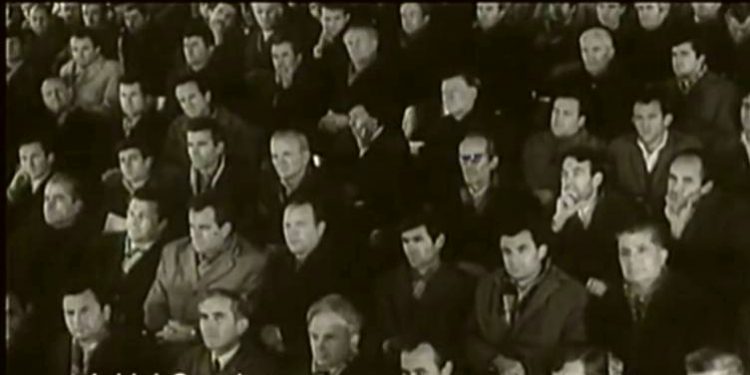
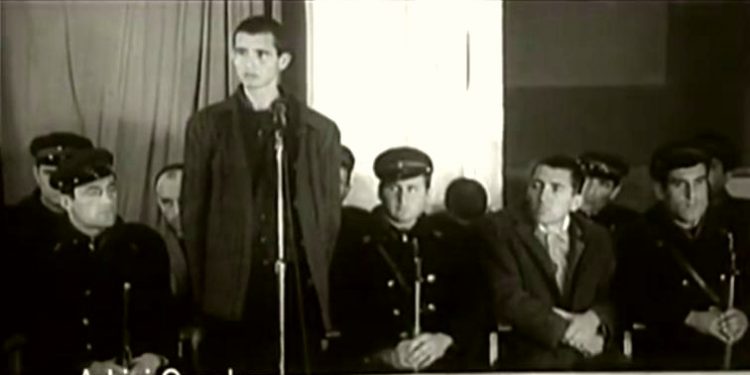
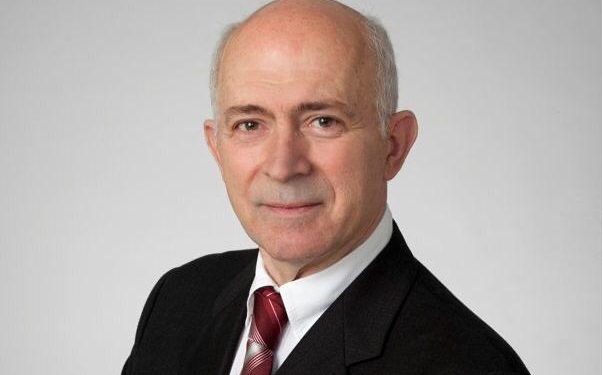
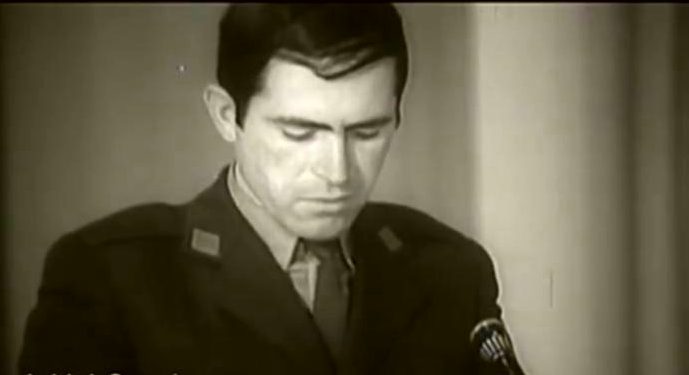
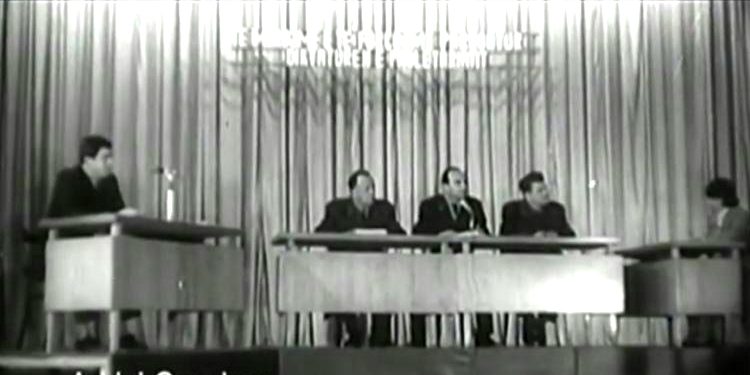
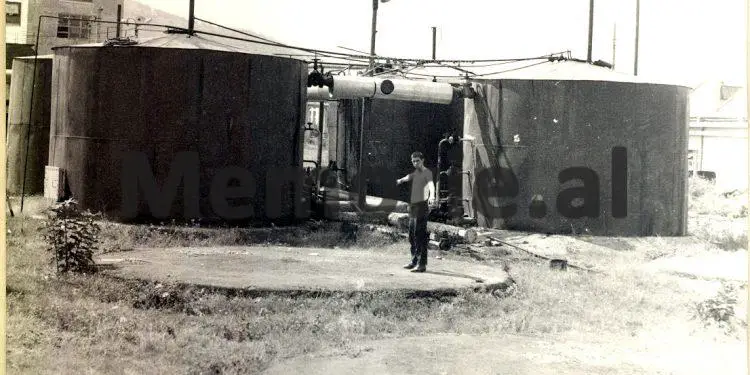
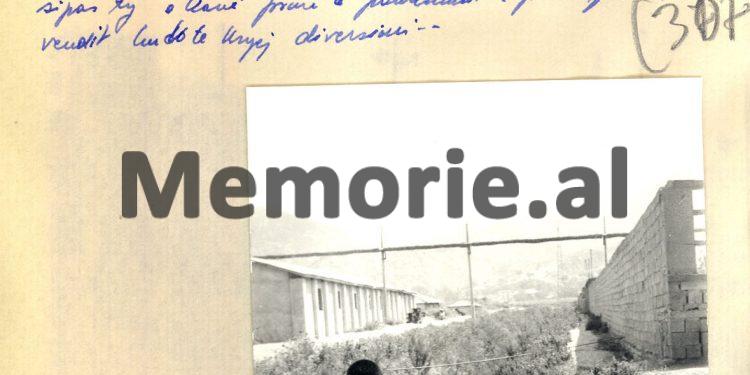
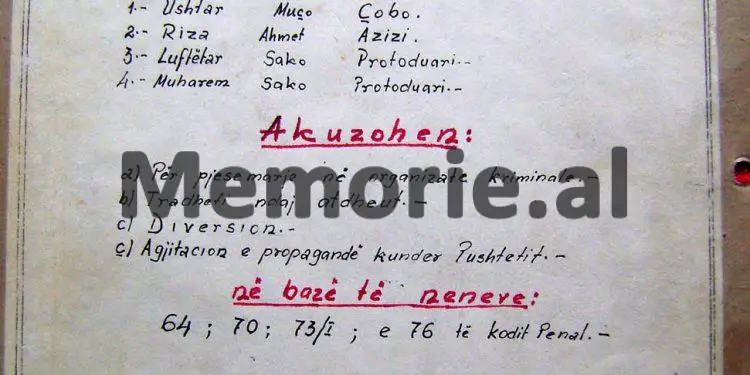
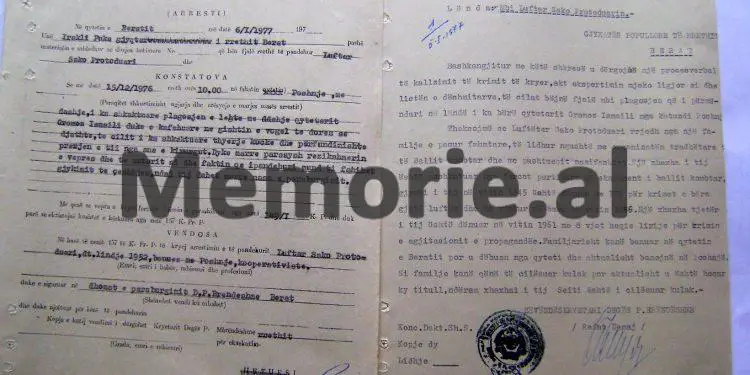
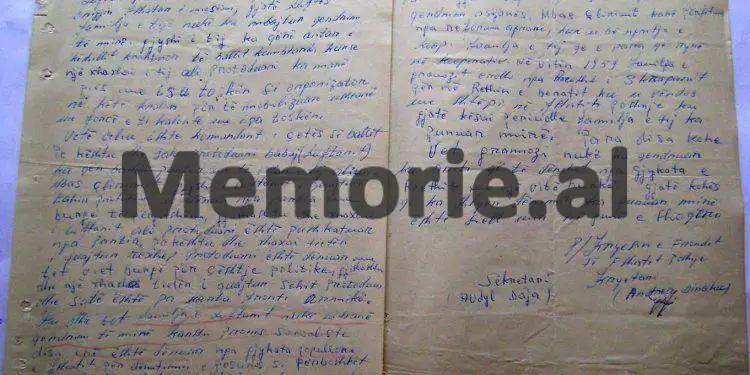
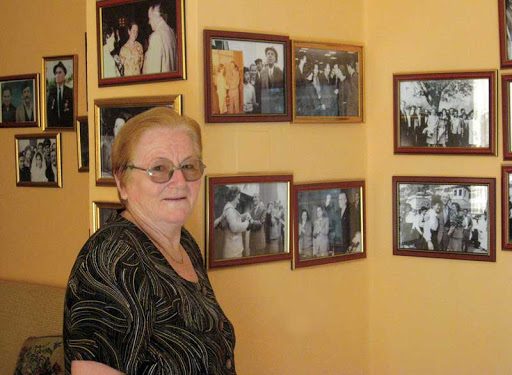
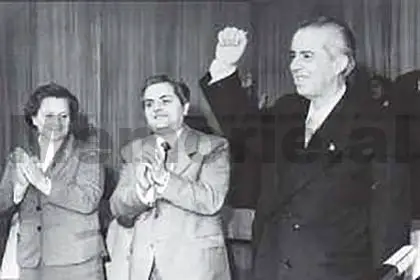
![“The ensemble, led by saxophonist M. Murthi, violinist M. Tare, [with] S. Reka on accordion and piano, [and] saxophonist S. Selmani, were…”/ The unknown history of the “Dajti” orchestra during the communist regime.](https://memorie.al/wp-content/uploads/2026/02/admin-ajax-3-350x250.jpg)
![“In an attempt to rescue one another, 10 workers were poisoned, but besides the brigadier, [another] 6 also died…”/ The secret document of June 11, 1979, is revealed, regarding the deaths of 6 employees at the Metallurgy Plant.](https://memorie.al/wp-content/uploads/2026/02/maxresdefault-350x250.jpg)




